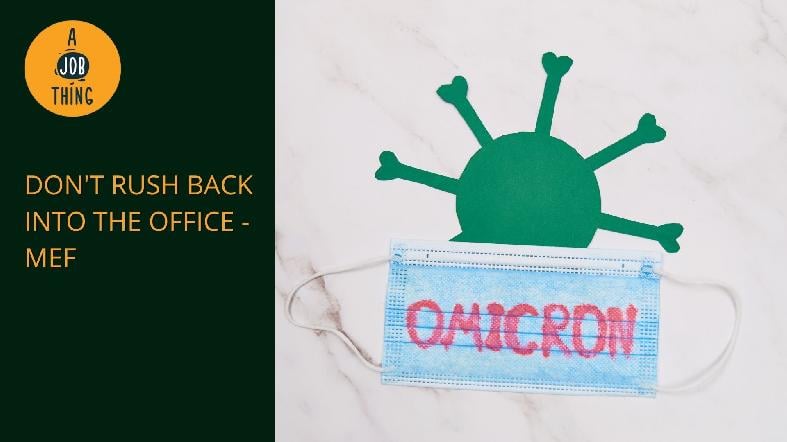
MEF Urge Employers Not to Rush Back Into the Workplace
Are You Hiring?
Find candidates in 72 Hours with 5+ million talents in Maukerja Malaysia & Ricebowl using Job Ads.
Hire NowEmployers are keeping a watchful eye on the Omicron variant of worry when Malaysians return from their holidays and return to work in the new year.
The Malaysian Employers Federation (MEF) warns employers not to rush back to work to minimise outbreaks, particularly as the new Covid-19 variant is thought to spread quickly and with fewer visible symptoms.
Limiting infection risk
"Returning all personnel to the job site could raise the danger of infection. Businesses should establish hybrid face-to-face and work from home (WFH) arrangements whenever possible to limit the risk of infection," says MEF president Datuk Dr Syed Hussain Syed Husman.
He said the Omicron variety is a key source of concern for employers since it might disrupt recovery efforts in 2022.
"The best approach is to tighten prevention measures to restrict its spread," he says of the variant, which is also said to be more resistant towards vaccines. Syed Hussain also warns bosses that even minor symptoms among their employees should be treated as a concern and a threat.
"Weekly Covid-19 self-testing for all employees should be in place to ensure that only infected personnel are permitted to access the workplace," he argues.
Importance of booster dose
Health Minister Khairy Jamaluddin recently approved shorter intervals for Covid-19 booster doses to halt the spread of new variations. Pfizer-BioNTech and AstraZeneca vaccine booster shots can be provided at least three months after the second dose.
Khairy said that after the discovery of a confirmed Omicron variant case in Sarawak in a man without any history of recent travel abroad, it is highly likely that the variant is now in the local community.
As a result, employers must step up their efforts to reduce the danger of Omicron variant infection.
.jpg)
Covid-19 infection at the workplace could severely affect the business.
Preventing the Omicron variant at the workplace
"One of the prevention techniques to protect workers is WFH, and organisations should provide clear instructions to avoid confusion."
When it comes to businesses that are unable to adopt WFH, Syed Hussain advises that supervisors should rearrange the workplace with physical separation in mind.
Syed Hussain also advises companies to provide proper indoor air quality and flow by following the Occupational Safety and Health Department's Guidance Note on Ventilation and Indoor Air Quality, which can be found at bit.ly/ventilation_guide.
"We also encourage personnel to follow SOPs to the letter, such as physical distancing, wearing a mask in public, washing hands with soap or sanitising hands after touching doorknobs or elevator buttons," he said.
The challenges of WFH for SMEs
WFH arrangements might be challenging to execute for small and medium enterprises (SMEs), given their limited personnel and resources. Since the reopening of sectors, SMEs have allowed most of their staff to return to work, according to SME Association of Malaysia national president Ding Hong Sing.
"We will continue to examine the situation and make appropriate plans."
"Returning to full WFH arrangements will be difficult because we require the staff on site." He added that some SMEs have only five or six full-time employees. Nonetheless, Ding said that some organisations allow specific employees, such as marketing or IT personnel, to participate in WFH to limit the virus's spread.
"Some SMEs also require employees to come in a few days a week rather than every working day," he said.
On the recent floods affecting SMEs
Ding also claims that small and medium-sized firms, particularly manufacturers, are looking for government aid after the recent floods that hit several Malaysian states.
"The machinery at these facilities has spoiled after being submerged by floodwaters, disrupting operations." He hoped the government will be able to provide some type of help for struggling SMEs.
Syed Hussain believes that all private-sector companies would continue to help workers affected by the recent floods.
He said that many people are still unable to return to work and they may require some time to deal with their condition before they can resume their jobs. He also noted that some firms have extended calamity leave for such employees.
He expressed MEF's hope that everyone would be able to recover soon from the floods' effects and continue working on getting the economy back on track.
While some employers have formed their own teams to aid their employees, others have offered medical assistance, including treatment for mental stress related to the disaster.
"MEF members and private sector employers should also support the efforts of government agencies and non-governmental organisations (NGOs) if they have the money and other resources to help flood victims," Syed Hussain said.
Source: The Star

